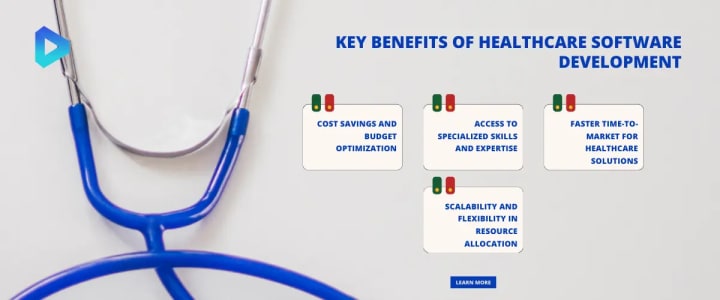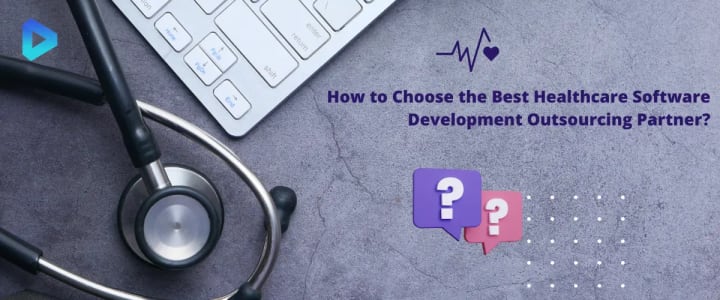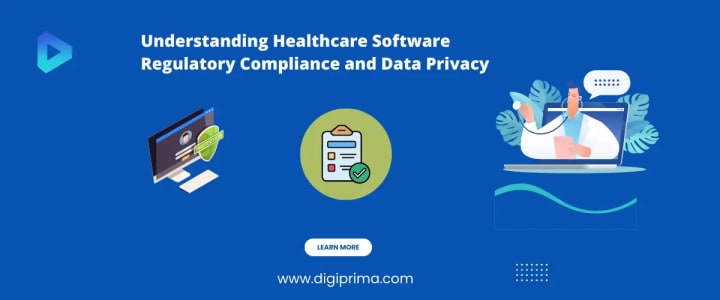Healthcare software development outsourcing involves healthcare organizations hiring external vendors or specialized companies to create and maintain software solutions for the healthcare industry. They delegate their software development tasks to these third-party providers. This helps healthcare organizations by giving them access to a wider range of skilled professionals, saving money, and allowing them to concentrate on their main tasks while specialized experts handle software development requirements.
When healthcare organizations outsource their software development, they can tap into a diverse group of experienced professionals who specialize in creating healthcare software solutions. These experts possess extensive knowledge about healthcare regulations and best practices, which guarantees that the software they develop fulfills the specific requirements of the industry. This enables healthcare organizations to leverage external expertise and focus on their core activities.
Moreover, outsourcing healthcare software development services often results in cost savings. By outsourcing, healthcare organizations can avoid the need to maintain an in-house software development team, which involves substantial investments in hiring, training, infrastructure, and ongoing operational expenses. Outsourcing allows organizations to leverage the expertise of external vendors while reducing overall expenses.
Growing importance of outsourcing in the healthcare industry
Outsourcing has witnessed growing importance in the healthcare industry due to several compelling reasons. One of the primary assets is the need for cost reduction and working efficiency. Healthcare organizations are constantly finding ways to optimize their resources and streamline processes to provide high-quality care while managing costs. When healthcare providers outsource non-core functions like administrative tasks, IT support, or revenue cycle management, they can benefit from external expertise and specialized services at a lower cost than if they were to maintain in-house teams.
Additionally, outsourcing in the healthcare industry allows organizations to access a vast pool of specialized talent and expertise. The healthcare sector requires a deep understanding of regulatory compliance, industry standards, and emerging technologies. Outsourcing partners typically have dedicated teams that possess extensive knowledge and experience in these areas. This allows healthcare organizations to take advantage of their specialized skills and valuable insights. This access to expertise helps healthcare providers navigate complex challenges, implement best practices, and stay ahead of industry trends.
Outsourcing also provides healthcare organizations with scalability and flexibility. The industry experiences fluctuations in demand, such as seasonal variations or sudden spikes in patient volumes. By outsourcing certain functions, healthcare providers can quickly adjust their resources and scale their operations up or down as needed. This flexibility enables healthcare organizations to effectively handle capacity, minimize wait times, and maintain a seamless workflow. As a result, it enhances patient satisfaction and improves outcomes.
Benefits of Outsourcing Healthcare Software Development

A. Cost savings and budget optimization
B. Access to specialized skills and expertise
C. Faster time-to-market for healthcare solutions
D. Scalability and flexibility in resource allocation
Key Considerations in Choosing a Healthcare Software Development Outsourcing Partner

A. Cost savings and budget optimization:
Outsourcing healthcare software development presents significant cost savings and budget optimization opportunities for healthcare organizations. By partnering with external software development companies, healthcare providers can eliminate the expenses associated with maintaining an in-house development team. This includes costs related to recruitment, training, salaries, benefits, and infrastructure.
B. Access to specialized skills and expertise:
Outsourcing healthcare software development provides healthcare organizations with access to specialized skills and expertise. It requires a unique combination of software engineering knowledge and an understanding of the healthcare domain. By outsourcing, organizations can access a dedicated team of professionals who have extensive expertise in healthcare regulations, industry standards, and best practices.
C. Faster time-to-market for healthcare solutions:
Outsourcing healthcare software development enables healthcare organizations to achieve faster time-to-market for their solutions. In the competitive healthcare industry, speed is crucial for introducing innovative solutions and gaining a competitive edge. External software development companies have established processes, frameworks, and resources dedicated to speeding up development cycles.
D. Scalability and flexibility in resource allocation:
The healthcare industry faces changes in demand caused by factors like seasonal variations, fluctuating patient volumes, or the introduction of new services or treatments. Outsourcing provides scalability and flexibility in resource allocation to effectively manage these fluctuations. Outsourcing healthcare software development provides scalability and flexibility in resource allocation.
Challenges and Mitigation Strategies

A. Communication and language barriers
B. Time zone differences and project management challenges
C. Ensuring data security and privacy
D. Managing cultural differences and expectations
A. Communication and language barriers:
One common challenge in healthcare software development outsourcing is communication and language barriers. Different time zones, cultural contexts, and language proficiency can hinder effective communication. To address this challenge, it is important to establish clear communication channels and protocols from the beginning to ensure a thorough understanding of expectations and requirements. The use of project management tools, visual aids, and written documentation can help overcome language barriers.
B. Time zone differences and project management challenges:
Time zone differences can pose challenges in coordinating project activities and maintaining timely communication. To address this, it is crucial to establish overlapping working hours or designate specific hours for real-time collaboration. Utilizing project management tools and collaborative platforms that facilitate asynchronous communication can help manage projects across different time zones.
C. Ensuring data security and privacy:
Data security and privacy are paramount in healthcare software development outsourcing. Healthcare organizations must ensure that their outsourcing partners follow stringent security protocols and comply with applicable regulations like HIPAA or GDPR. Secrecy clauses and non-disclosure agreements should be in place to safeguard sensitive patient data.
D. Managing cultural differences and expectations:
Cultural differences and varying expectations can impact communication and collaboration in outsourcing relationships. Building cultural awareness and understanding is crucial to effectively managing these differences. It creates a more collaborative and inclusive environment by dedicating time to understanding the outsourcing partner's culture, work practices, and communication styles.
Regulatory Compliance and Data Privacy

A. Compliance with healthcare regulations (HIPAA, GDPR, etc.)
B. Handling sensitive patient data and protecting confidentiality
C. Importance of conducting regular security audits and risk assessments
A. Compliance with healthcare regulations (HIPAA, GDPR, etc):
Compliance with healthcare regulations is paramount in healthcare software development outsourcing. Healthcare organizations must ensure that their outsourcing partners possess a comprehensive understanding of relevant regulations such as HIPAA or GDPR. The partner should have well-established processes and policies in place to guarantee compliance.
B. Handling sensitive patient data and protecting confidentiality:
Securing sensitive patient data is a crucial consideration in healthcare software development outsourcing. Healthcare organizations must establish clear guidelines and contractual agreements with their outsourcing partners to safeguard the secrecy of patient information. This involves implementing robust data protection measures, including encryption, access controls, and secure storage practices.
C. Importance of conducting regular security audits and risk assessments:
To maintain data security and minimize weak points in healthcare software development outsourcing, regular security audits and risk assessments are essential. Healthcare organizations should regularly audit their outsourcing partners' security practices and infrastructure to ensure compliance with industry standards and regulations. This involves evaluating the effectiveness of data protection measures and identifying potential risks and weak points.
Visit Us - www.digiprima.com



.jpeg)

No comments:
Post a Comment